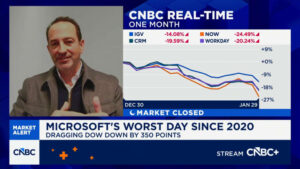U.S. bond yields were slightly higher early Tuesday as traders eyed the release of the March employment data due Friday.
What’s happening
-
The yield on the 2-year Treasury
TMUBMUSD02Y,
4.015%
gained by 2.5 basis points to 3.995%. Yields move in the opposite direction to prices. -
The yield on the 10-year Treasury
TMUBMUSD10Y,
3.468%
rose 3.5 basis points to 3.453%. -
The yield on the 30-year Treasury
TMUBMUSD30Y,
3.673%
added 1.8 basis points to 3.654%.
What’s driving markets
A calm tone across global markets was reducing demand for government paper early on Tuesday, nudging up yields.
Traders were eyeing U.S. jobs data due in coming sessions, aware of the impact they may have on the Federal Reserve’s rate decision in a month’s time. The ADP private sector payrolls report is due on on Wednesday and the U.S. Labor Department employment survey on Friday when the U.S. bond market will be open only for a half day.
Markets are pricing in a 60% probability that the Federal Reserve will raise its policy interest rate by another 25 basis points to a range of 5.0% to 5.25% after its meeting on May 3rd, according to the CME FedWatch tool.
The central bank is expected to keep its Fed funds rate around that level until perhaps September, when it may begin trimming borrowing costs again, according to 30-day Fed Funds futures.
U.S. economic updates set for release on Tuesday include factory orders and job openings, both for February and both released at 10 a.m. Eastern.
Cleveland Fed President Mester is due to make comments at 6 p.m.
Australia’s 10-year bond yield
TMBMKAU-10Y,
was down 6.4 basis points to 3.267% after the country’s central bank left interest rates unchanged at 3.6%, halting a string of 10 consecutive hikes.
What are analysts saying
Stephen Innes, managing partner at SPI Asset Management, noted that recent Fed speakers had mostly pushed back against the idea that banking sector stresses would automatically impact interest rate policy.
“Fed officials mostly reiterated the critical messages from Chair Powell at the March FOMC meeting: the banking system remains sound and resilient, and tightening credit conditions would likely substitute for some rate hikes. However, the extent was still highly uncertain,” said Innes.
“On market stress, Fed officials also discussed how banking stress could impact the economic outlook and future policy. Minneapolis Fed President Kashkari and Boston Fed President Collins saw the banking stress as raising the recession risks. Meanwhile, St. Louis Fed President Bullard remained optimistic that a recession could be avoided and that macro-prudential tools could deal with financial stresses while monetary policy focuses on containing inflation.”
“Bullard noted that he lifted his rate projection for 2023 to 5.625%. While Collins revealed that her dot was around the median of the March SEP, she sounded more hawkish by noting that additional tightening will be needed, a contrast to the word ‘may’ used in the March meeting statement,” Innes added.
This post was originally published on Market Watch







